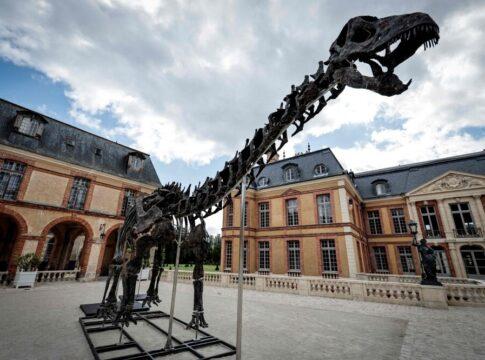In a confluence of history, science, and commerce, the skeleton of a colossal apatosaurus, affectionately nicknamed ‘Vulcan,’ has been sold in Paris for a staggering six million euros. This ancient giant, estimated to have roamed the Earth 150 million years ago, was acquired by an anonymous collector who has generously agreed to display it in a museum, much to the delight of the scientific community and the public alike.
The sale, orchestrated by renowned auction houses Collin du Bocage and Barbarossa, marks a significant event in the world of paleontology. “We are thrilled that the buyer intends to lend it to an institution,” remarked Olivier Collin du Bocage, underscoring the importance of public access to such rare specimens. Recognized as the largest dinosaur ever sold at auction, Vulcan’s skeleton is composed of 75 to 80 percent original bones, a testament to its remarkable preservation.
Discovered in Wyoming in 2018, Vulcan’s journey from the dusty plains of the United States to the elegant halls of a French museum is a tale of modern exploration. Wyoming, a region celebrated for its rich paleontological sites, permits individuals to acquire concessions for excavating fossils. This legal framework allowed a French investor to finance the meticulous excavations from 2019 to 2021.
Post-excavation, Vulcan was transported to France, where it underwent two years of painstaking restoration at the Paleomoove Laboratory in Luberon. The expert team there ensured that the dinosaur, which weighed approximately twenty tonnes in its prime, was ready for its next chapter.
Paleontologists are particularly excited about the acquisition. “Having access to such a well-preserved skeleton is invaluable for research,” said Dr. Marie Dupont, a leading paleontologist at the National Museum of Natural History in Paris. She emphasized that studying Vulcan could provide insights into the environment and life forms of the Jurassic period.
Financially, the sale exceeded initial estimates, which ranged from three to five million euros, highlighting the burgeoning interest and value in prehistoric artifacts. This sale reflects a growing trend in the auction market, where rare dinosaur fossils have become coveted treasures for private collectors and institutions alike.
The inclusion of a clause allowing paleontologists to study Vulcan underscores the collaborative efforts between private collectors and the scientific community. This partnership is essential for advancing our understanding of Earth’s ancient history. Moreover, the auction’s success may prompt further excavations in fossil-rich areas, potentially unearthing more prehistoric marvels.
As Vulcan prepares to take its place in a museum, it stands not only as a relic of the past but also as a beacon of scientific curiosity and international collaboration. This ancient giant will soon be available for the public to marvel at and learn from, bridging the gap between ancient history and modern-day appreciation.


